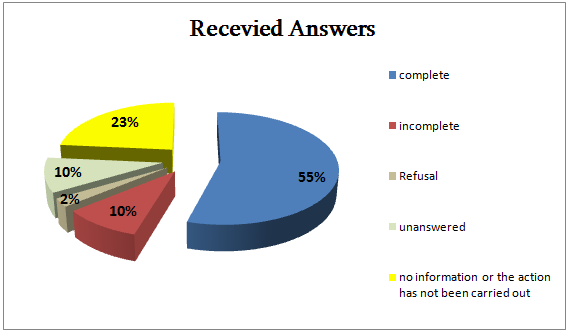


Please view the power point presentation on the following link:
![]() Access to Information in Public Institutions in 2013-2014
Access to Information in Public Institutions in 2013-2014
Between October 1, 2013 and March 1, 2014, within the frames of the “Database of Public Information – www.opendata.ge” project, IDFI has

Based on the answered received from the public institutions, project team elaborated the access to information rating.
According to IDFI, the most complete answers in compliance with the 10-day period were received from the following institutions:
The least accountable public institutions included:


One of the major aims of the research was displaying whether the public institutions managed to maintain the positive tendencies in terms of access to information after the October 1, 2012 parliamentary elections.
The comparison of the access to information indicators of the public institutions between October, 2013 and March, 2014 displayed that:

Only 11 public institutions showed the progress in terms of access to information compared to the indicators of the previous project. The progress of the Administration of the President of Georgia is especially notable – 20%. In case of three institutions 100% access indicator is maintained, while the rest of the 15 institutions showed regress. We should emphasize the case of Ministry of Economy and Sustainable Development of Georgia with the indicator of access to information decreased by 61%.

In order to illustrate the change of attitudes towards releasing the public information among the public institutions, we provide the comparison of the received answers from the same institution on the same request in previous and current projects.
In case of the Ministry of Internal Affairs of Georgia, during the previous project, institution provided the detailed information about the bonuses of high officials; this time, request is ignored.
For instance, previously, Ministry of Economy and Sustainable Development provided the detailed information about the business trip costs of each high official, while during the current project Ministry just provided the summarized amount.
Ministry of Finance of Georgia provided the detailed information about the bonuses of each high official separately, while during the current project Ministry just provided the summarized amount.
The Office of State Minister of Georgia for Diaspora Issues provided the detailed information about the bonuses of each high official. During the current project this information was not provided as according to the institution, this information contains personal data.
Unlike the previous project, Ministry of Sport and Youth Affairs provided complete information about the bonuses and supplements.
The most challenging request for the public institutions turned out to be the copies of the sent and received business-related e-mails of the high officials. 32% out of the 25 institutions ignored the request, while 24% explained that the requested information was not public and refused to provide them.
Requests of copies of business-related e-mails of the officials were ignored or refused by the following institutions:

The following institutions provided the copies of the business-related e-mails of the high officials:
Ministry of Education, Culture and Sport of Autonomous Republic of Adjara
After the October 1, 2012 Parliamentary elections, as a result of the shift of the political power, positive tendencies were observed in terms of releasing the information. IDFI was hoping that the growing tendency of openness among the institutions would be preserved, but the presented study displayed that in case of number of public institutions, positive tendency of openness was connected to the initial stage of the new government, when there was less will to conceal any kind of information.
We should especially emphasize the cases of the Ministry of Economy and Sustainable Development of Georgia, Ministry of Internal Affairs of Georgia and the Ministry of Finance of Georgia – these institutions failed to provide the information which was available on the initial stage of the political change, in the beginning of 2013.
We welcome the fact that the number of public institutions maintained the high ratings of access to information. We should put strong emphases on the cases of the Ministry of Regional Development and Infrastructure and the Ministry of the Environment and the Natural Recourses Protection – both institutions preserved the 100% indicator of access to information.
Among the most progressive public institutions there are the Administration of the President of Georgia and the Chancellery of the Government of Georgia. IDFI expresses hope that the positive changes in case of the Administration of the President of Georgia is not connected to the initial stage of the shift of power which occurred after the Presidential elections of November 2013 and the progress will be maintained.